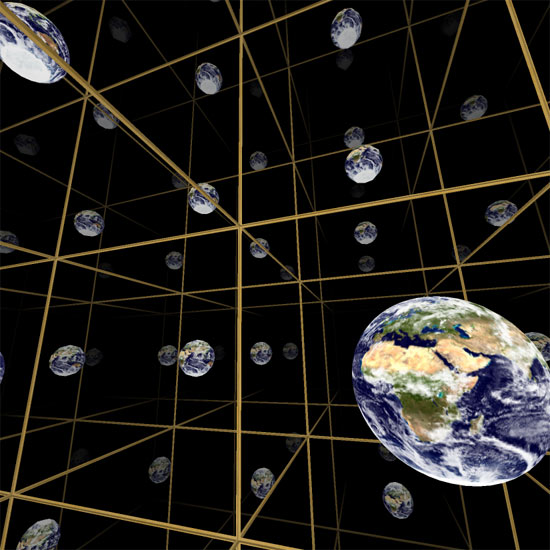All Seeing Eye
Admiral
My Sci Tech posting days are over.
But you are asking this in a really bad place... the stuff posted in this thread proves that this is not the place for real answers.

They weren't. They "condensed" from energy a short time after the BB.Why was there matter and anti-matter at the beginning of the universe?
The same as matter.Where did this matter anti-matter come from?
No time = no how long. In other words, your question is meaningless in the BB theory mindframe.If time did not exist before the big bang then how long was the matter and anti-matter there before the explosion?
Time is just another dimension. A geometrical point need no time-dimension to exist. Actually, it need no dimension at all. But it exists, even if just in our minds.If time did not exist how could it be there?
Explosion is a misnomer.and how could it explode?
They weren't. Matter and antimatter were created in the fist phases of the universe. They were not "pre-existent".When they say "matter and anti-matter" what exactly was it? Hydrogen? other elements? How were the protons, neutrons and electrons of these elements created in the first place if the big bang had not happened yet?
Sorry pal, this is philosophy, not science.Why is anything even here at all?
It stops at the fundamental level, I suppose. That's why finding the "building blocks" is so interesting.If everything has to be made of something then just where the hell does it stop?
As I understand it (but superstrings physics is not my fiend), strings are not "made" they just "do". You can see them as mathematical constructs, whose actions (oscillations) give rise to matter. At this level of theorization, the separation between "matter" and "action" becomes fuzzy.Even with string theory, just what the heck are the strings made of? and what is that made of?
Probably, no more that quantum level. Under Plank's length, "space" makes no more sense.just how small can you actually go?
Nothing. The Universe itself is expanding. There is no "external" point of view. Everything is happening "on the inside".What is the universe expanding into?
We call it the singularity, because it's singular, i.e. outside the capability of our theory to explain it. We can explain things very early, but not at "instant 0".Before the actual big bang occurred creating the universe what was that small point of matter and anti-matter in?
Meaningless, as there was no space.where was it located?
Why it should be?Could the universe just be an illusion?
Sorry, I don't think we can get at the bottom of this here, but maybe give some answers as modern cosmology understands them.Let's get to the bottom of this shall we and let's keep it about science.
Er, no. The Big Bang created the universe as we know it, including time and space. There was no universe "before" or "outside". Maybe something different, but not the space-time as we understand it.The big "nothingness" that the matter and energy is expanding into, that nothingness IS the universe. Just as much as the substance is the universe. The big bang didn't create the universe, it "released" the matter and energy that had been held by (gravity?) in a tight area, to enlarge into the universe.
It's creating space. So it can expand "inside itself".It has to be expanding into something or how can it possibly expand at all?
Actually, an atom is made almost of nothing.It's like atoms, everything HAS to be made of something or how could it exist?
They are mathematical construct. I suppose you can say they are made of "action", without underling "matter", as they create matter with their oscillation.there's string theory but what the hell are the strings made of?
As we understand it, Plank's length.how far down does it go?
Not really. In quantum physics, you arrive at a point where "being" and "acting" are the same thing.it must be infinite because how can something exist if it's not made of something?
Real enough to pay for my post-doc fellowship, I hope!Which leads me to the question, is any of this even real at all?
It doesn't stop, but it lose meaning as we understand it. The boundary is, wait for it, Plank's time. Under that, time is no more.Same goes for time, how slow can you go before time stops still?
Meaningless.would time even stop?
No. Under Plank's length, we don't have time anymore as we understand it.can you slow down infinitely without stopping?
If by "everything" you mean the universe as we know it, yes it was: the BB. If you mean something else, it's outside the boundary of scientific inquiry, which is a nice way to say I don't know.So was there a beginning to everything?
"Why?" is not a good question with physics. Try "How?".and if there was no beginning and the universe is infinite then why is it infinite?
Philosophy, not science.how is it even possible for existence to exist rather than nothingness if there was no beginning.
Your analogy is flawed. The balloon is still expanding into something.







People around here want everything simple, everything easy, everything safe. The answers are (apparently) uncomfortable for some people, and so the retreat to the safe ideas (saying that no body can understand that stuff). And given that, answering these questions around here is always a waste of time... but I had some time to waste today.
What is the universe expanding into?
But really has been the S&T forum as bad recently? I come here now and then, and I'm not up to date with everything happening here...
I'm not saying that everyone is like this, but when people ask hard questions expecting easy answers... and then dismiss the actual answers because they seem counter-intuitive without working (even a little) to learn how to understand them, it gets frustrating.But really has been the S&T forum as bad recently? I come here now and then, and I'm not up to date with everything happening here...

The big "nothingness" that the matter and energy is expanding into, that nothingness IS the universe. Just as much as the substance is the universe. The big bang didn't create the universe, it "released" the matter and energy that had been held by (gravity?) in a tight area, to enlarge into the universe.
Very interesting post, Shaw. You are totally right about the torus. To me it's quite natural to thing about geometry in a certain way, but then again, probably most people aren't.
But really has been the S&T forum as bad recently? I come here now and then, and I'm not up to date with everything happening here...
I didn't see that one. When was it again? Last week I was in Prague for a well deserved holiday with the fiancée.Very interesting post, Shaw. You are totally right about the torus. To me it's quite natural to thing about geometry in a certain way, but then again, probably most people aren't.
But really has been the S&T forum as bad recently? I come here now and then, and I'm not up to date with everything happening here...
I missed you in the Dark Matter thread. I was hoping you would post some comments, but alas, you did not.

Found it. In general terms, what was said was not really off the mark. I don't think it would be useful to answer it now since the thread has been virtually dead for some time, but if you would like, I can give it a try.It is at the bottom of Page 3 in this forum.
If you excuse me, I think this Iguana has something in his eyes...You shot my ideas down about the Static State Universe, but I was able to recognize the intelligence in your post. Even though we differ in opinion, mine is based on belief, yours is based on science, I have come to look forward to reading your posts. You are the Italian Iguana in my mind, but one smart lizard when it comes to the Universe.

Tacky (if you ever come back here), a number of the questions you ask in the OP are where science crosses into philosophy, especially the "are we really here? Is it all an illusion?" questions. As Shaw, said, a number of the answers are counter-intuitive, I know when I've looked at this stuff I've ended up scratching my head. The secret is to get source books and papers and read them carefully, following each step. When you understand one step, then move on to the next one, and not before.
With this stuff there are no easy answers, but there are answers if you're prepared to put in the hard yards.
let's keep it about science.
We use essential cookies to make this site work, and optional cookies to enhance your experience.
